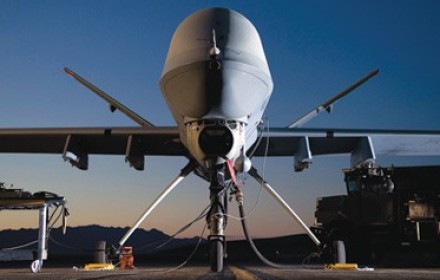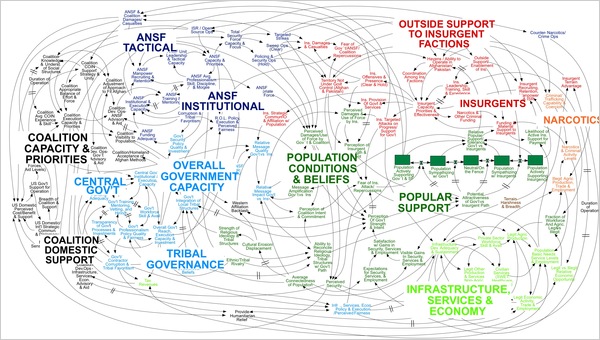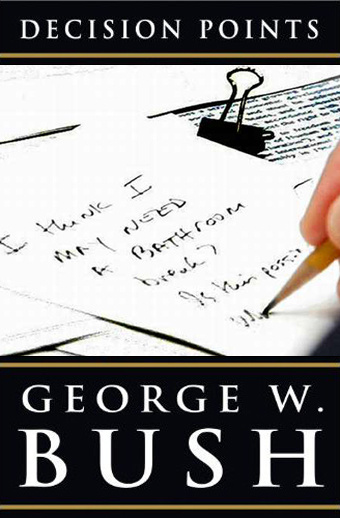
 |

“Decision Point: Is it a good idea for me to land on an aircraft carrier in a flight suit with a sign that says ‘Mission Accomplished‘? Key Decision: How is it not a good idea?” On the announcement that former President Bush’s forthcoming memoirs will be called, um, Decision Points, the wags at the Gawker crime lab have some fun with Photoshop. (Speaking of decision points, I will concede that it’s very smart of the GOP powers-that-be to wait until the week after Election Day to remind America of the Dubya years.)
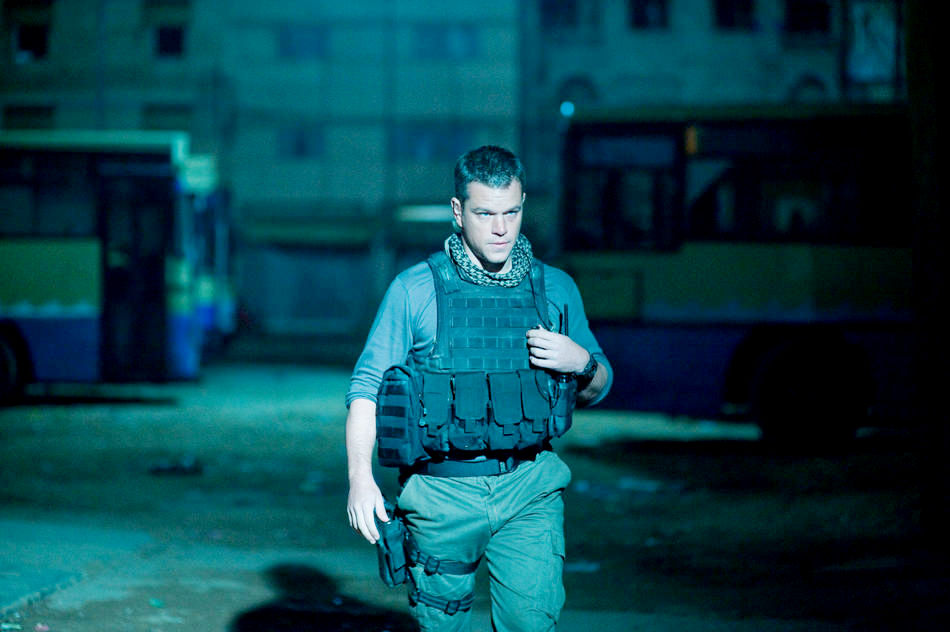
On this St. Patrick’s Day, what better recent release to discuss here at GitM than Paul Greengrass’ Green Zone? Not only do we have two shades of emerald in that last sentence, but we’re now on the cusp of the 7th anniversary of the beginning of the War in Iraq. (It broke out, I well remember, just as I was heading to a March Madness weekend in Vegas.) Alas, I just wish I had a better sitrep to report.
I don’t mean to be too harsh — There’s nothing terribly wrong with this edutainment-y attempt to explain de-Baathification, highly dubious detainee procedures, and most notably the faked WMD casus belli to disinterested laypersons by way of action-thriller. And, in a way, I sorta admire the gutsiness of the the attempt. But, if you were already well aware of these grim developments, and I assume most GitM readers are, then it’s hard to escape the sensation that one is mainly just being talked down to for two hours. Wait, there were no WMD in Iraq? You’re kidding me, right? And, while I’m a great fan of Greengrass’ previous output — I said over and over again in this space that I wish he had stuck with Watchmen, and on the Top 100 films of last decade list, Bloody Sunday was #84, his two Bournes were at #49, and the exemplary United 93 was at #6 — The Green Zone feels quite a bit more leaden than usual.
As with the political edutainment project Greengrass aspired to here, I like the idea of fusing his highly visceral action work (the Bournes) with his fly-on-the-wall discursions into recent history (Sunday, ’93)…on paper. But The Green Zone gets lost somewhere in the interstice, and lacks the gripping power of either of these previous Greengrass grooves. Instead, Zone ends up mostly being two grainy hours of watching Matt Damon run around at night, as he tries to uncover an insidious government plot that our nation has been fully aware of for years…and has chosen to greet with a yawn.
More on that depressing problem in a bit, but, first, to bring y’all up to speed: Loosely based on Rajiv Chandrasekaran’s Imperial Life in the Emerald City, a non-fiction examination of Dubyaite imbecility and excess in post-war Baghdad, Green Zone begins with a brief sequence set amid the original Shock-and-Awe period of the war, followed by, a few weeks later, a tense raid on a possible WMD storehouse by American soldiers. Led by Chief Warrant Officer Roy Miller (Damon), this crack MW2-ish assault ends up finding, well, bupkis, just like the time before and the time before that.
To Chief Miller, the problem here is obvious — the intel must be rotten. But, when he brings this up at the next briefing for high-level military muckety-mucks, he is basically told to shut up and do his job. Nonetheless, events soon conspire to introduce Miller to the “Jack of Clubs” in the Dubya deck, a Baathist general (Yigal Naor) with a still-clearly extant power base in Baghdad. And, when our hero digs deeper to figure out how this Jack might know “Magellan,” the top-secret source of all this lousy intel, he soon finds himself trapped — along with a very Judith Miller-y reporter (Amy Ryan) — in a power play between a slimy executive branch bureaucrat (Greg Kinnear, stuck no more) and a grizzled CIA hand (Brendan Gleeson), one that might just end up getting Miller fragged by the creepy Special Forces guy (Jason Isaacs, with great accent) who keeps popping up…
Along the way, there’s a digression into a detainee facility with all the makings of an Abu Ghraib waiting to happen, the tearful homecoming of the administration’s hand-picked Iraqi stooge (re: Ahmed Chalabi), some rather pained attempts to make the decision to de-Baathify an action beat…In other words, Green Zone is basically an attempt to dramatize the Iraq war for people who, for whatever reason, weren’t paying much attention the first time ’round. And, to be fair, it’s done with solid acting all around (including several folks recognizable from United 93), quality production values, and a reasonable degree of versimilitude throughout. (Note also the brief Paul Rieckhoff cameo, which should nip any IAVA whining about dramatic license right in the bud.)
But, for all its edutainmenty truths to tell, Green Zone still ends up feeling rather fake and film-ish to me, perhaps in part because — unlike Greengrass’ other recent histories — it seems to subscribe to a very movie-like All the President’s Men view of things, where, once word of misdeed gets out, justice will be done tho’ the heavens fall. Not to get all Debbie Downer up in here, but that’s not really the way the world works anymore, is it? One of the saddest and scariest moments in the recent and very worthwhile Daniel Ellsberg: The Most Dangerous Man in America is when Ellsberg explains how he thought everything would change once the Pentagon Papers got out…and then he finds that, in the face of clear and irrefutable evidence of government wrongdoing, most people just shrugged.
This is the uncomfortable horror that Green Zone almost seems willfully designed not to recognize. The whole premise of the movie seems to be that, if We the People knew what really went down in Iraq (or could just be taught via action-movie), we would be totally livid about the corruption involved. But, is the problem really that the American people don’t know what happened in the build-up to Iraq? Or is it that we know pretty well what happened and don’t much seem to care?
Just as with our indefensible dabbling in torture and indefinite detention in recent years, we have known about the lies and incompetence that fueled the Iraq fiasco for awhile now. And, alas, nothing ever happened. Dick Cheney, Karl Rove, and the whole awful, lying lot are still deemed Serious People with Serious Opinions by the nation’s domesticated media watchdogs, who, by the way, have also been studiously ignoring the Blair hearings overseas. Our current president, elected with the largest mandate for change in a generation, has deemed all of this just the sins of the past and refused to “look backward” (or worse, made himself complicit in these Dubya-era crimes.) And life continues, much as it has this past age, with no sense of reckoning whatsoever for the Big Lies that were told.
One of the main reasons Bloody Sunday and United 93 work so well is that they offer complex, nuanced portraits of complicated times. But, as Green Zone moves along, it just ended up feeling more and more like a cartoon to me, and one predicated mainly on wishful thinking. Like I said, I guess I admire what Paul Greengrass & co. were trying do here, but Green Zone as an action film feels flat and mostly uninvolving. And Green Zone as a political enterprise — Iraq War: The Movie!, basically — often seems at best condescending and at worst dangerously naive.
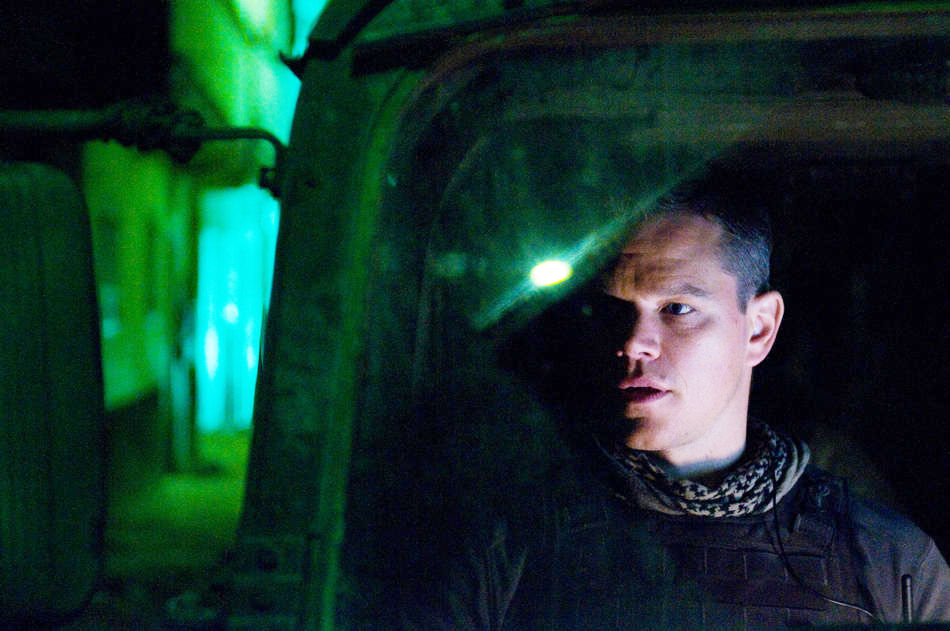
 “‘This is probably the best example of violation of the separation of church and state in this country,’ said Weinstein. ‘It’s literally pushing fundamentalist Christianity at the point of a gun against the people that we’re fighting. We’re emboldening an enemy.'” “‘This is probably the best example of violation of the separation of church and state in this country,’ said Weinstein. ‘It’s literally pushing fundamentalist Christianity at the point of a gun against the people that we’re fighting. We’re emboldening an enemy.'”
I like Saving Private Ryan as much as the next guy, but this, in a word, is ridicky-goddamn-diculous. Apparently, our troops in Iraq and Afghanistan are routinely outfitted with sniper rifles etched with New Testament verse. “Trijicon confirmed to ABCNews.com that it adds the biblical codes to the sights sold to the U.S. military. Tom Munson, director of sales and marketing for Trijicon…said the inscriptions ‘have always been there’ and said there was nothing wrong or illegal with adding them. Munson said the issue was being raised by a group that is ‘not Christian.’“
Newsflash: Given that we’re currently engaged in multiple wars and are strongly trying to avoid any appearance of being involved in any sort of anti-Muslim Crusade, arming our soldiers with “Jesus rifles” and crafting bible-thumping war reports for the Commander-in-Chief isn’t just catastrophically stupid. It’s basically writing the Al Qaeda recruiting posters for them.
Update: Also, “They started it!” is not an appropriate response to this dismal revelation.
Update 2: Trijicon stands down — Jesus rifles are hereby discontinued, most likely because of quotes like these: “General David Petraeus also addressed the scopes this morning, calling the matter ‘disturbing and a serious concern for me.‘”
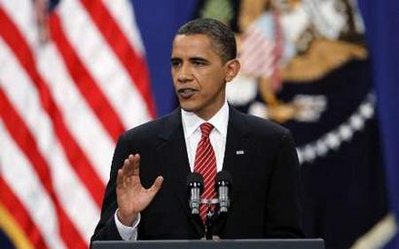 “First, there are those who suggest that Afghanistan is another Vietnam. They argue that it cannot be stabilized and we are better off cutting our losses and rapidly withdrawing. Yet this argument depends upon a false reading of history. Unlike Vietnam, we are joined by a broad coalition of 43 nations that recognizes the legitimacy of our action. Unlike Vietnam, we are not facing a broad-based popular insurgency. “First, there are those who suggest that Afghanistan is another Vietnam. They argue that it cannot be stabilized and we are better off cutting our losses and rapidly withdrawing. Yet this argument depends upon a false reading of history. Unlike Vietnam, we are joined by a broad coalition of 43 nations that recognizes the legitimacy of our action. Unlike Vietnam, we are not facing a broad-based popular insurgency.
And most importantly, unlike Vietnam, the American people were viciously attacked from Afghanistan and remain a target for those same extremists who are plotting along its border. To abandon this area now — and to rely only on efforts against al-Qaeda from a distance — would significantly hamper our ability to keep the pressure on al-Qaeda and create an unacceptable risk of additional attacks on our homeland and our allies.”
This is a bit late by now, but regardless: As you all know, President Obama made the case last week for sending 30,000 more troops in Afghanistan. At this point — and like Fred Kaplan — I’m conflicted about our continued involvement there…but I’m leaning toward withdrawal. Everything I’ve heard about the war lately has had that “Vietnam in ’66” sense to it: A corrupt government as our ally; trouble winning “hearts and minds”; The US stepping half-blindly into a conflict that’s been simmering for centuries (in Southeast Asia, it was the endless Vietnamese war against interlopers; here it’s long-simmering ethnic rivalries between the Pashtuns and everyone else.) And now, our new progressive-minded president tells us: If we just commit X more troops (where, now X=30,000), we can win, close up shop, and go home. Uh, really? I think I’ve already seen this movie a few times.
Obama’s shout-out above to basically token international support doesn’t assuage my fears. And, as far as the threat posed by Vietnam: True, Tonkin never happened, but obviously policymakers of that era were less sanguine about a Communist victory in South Vietnam than we are today — The threat of the Enemy can always gets unduly amplified in the heat of the moment. (Speaking of said Reds, it should sober us to acknowledge that all we’ve done so far in Afghanistan is basically manage to re-create the Soviet experience in the region. Iirc, that didn’t end so well.)
Al Qaeda is in Afghanistan, yes, and if we could weed them out and destroy their capacity to attack again, all the better. (And always remember: If Dubya, Rummy et al had just finished the job properly in 2002 rather than salivating over Iraq, we would be in a lot better position right now.) But Al Qaeda is also in Somalia, Tajikstan, Yemen, the Philippines, Kosovo…all over the place. We don’t have the resources to play whack-a-mole in all these nations anymore, particularly when every whack usually just works to create new moles. (You’d think we learn that the Hydra sprouts two more heads every time you cut off the wrong one.)
The biggest argument in favor of increasing our military position in Afghanistan would be the continued stability of neighboring Pakistan. (There’s Vietnam again — it’s another variation of the Domino Theory.) But, there’s a good amount of evidence to suggest that more troop increases by us will only inflame the situation and further destabilize Pakistan. In which case, I’m not sure what we’re doing over there, and what we could possibly accomplish in 18 months that we haven’t gotten done the last seven years.
In short, it seems to me like we had our shot in Afghanistan, and Dubya blew it. I could be wrong, of course. But, to my mind, now feels like a good time to recognize that fact and stop chasing good money after bad.
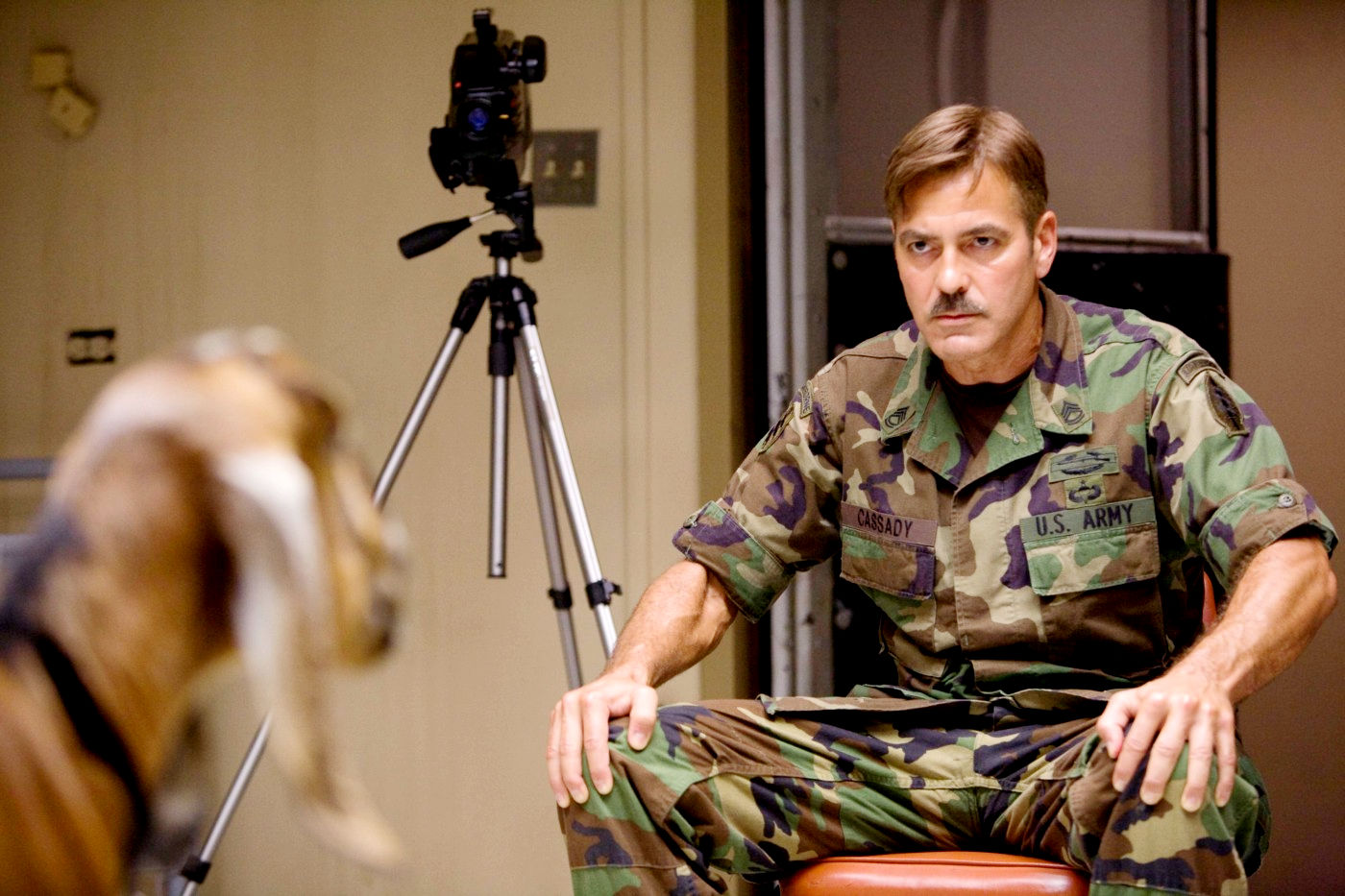 Less a scathing Catch-22-type satire than it is just a jaunty road movie-type yarn, Grant Heslov’s The Men Who Stare at Goats, which I caught last weekend, is basically a Coen-lite cinematic bon-bon for the fanboy-inclined. It’s never really laugh-out-loud funny, and something much more dark, resonant, and Strangelovian could ( and probably should) have been made from this choice material, particularly as the story moves into Iraq mode. After all, this is basically the true story of how we, the United States of America, ended up torturing people with Barney the Dinosaur.
But however frothy about its subject at times, The Men Who Stare at Goats manages to sustain a low-key whimsy and amiable weirdness for most of its run. If anything it feels a bit like the much-maligned and underrated Ocean’s 12: a bunch of exceedingly likable actors — George Clooney, Ewan MacGregor, Jeff Bridges, Kevin Spacey, Stephen Root, Stephen Lang, Robert Patrick — all enjoying an extended goof. Consider it the Road to Iraq, Hope and Crosby-style. David Crosby, that is.
Loosely based on the book by British journalist Jon Ronson, The Men Who Stares at Goats begins with an ambiguous disclaimer (“More of this is true than you would believe“), a Kitty Pryde-experiment gone awry, and a voiceover by one Bob Wilton (MacGregor), a down-on-his-luck reporter for the Ann Arbor Daily-Telegram. (Wilton, unlike Ronson, is an American, although MacGregor’s scattershot accent may make you wonder. Ewan’s a fine actor, but, lordy, he can’t get the Yankee patter down to save his life — yes, it’s worse than Peter Sarsgaard’s British accent, although it’s still better than Don Cheadle’s cockney.)
Anyway, after a chance interview with a psychic hamster-killer (Root) and a falling-out with his cuckolding wife and their mutual boss, Bob alights to Iraq, where he presumes he’ll learn how to impress his now-ex with grim tales of life as a veteran war correspondent. But unfortunately, he can’t even get into the country…until he happens upon Lyn Cassady (Clooney). Disguised as your run-of-the-mill private contractor, Cassady in fact turns out to be a psychic spy, a master of the “sparkly eyes,” a, as he puts it, “Jedi warrior.” (To which MacGregor consistently responds, “Jedi?,” with an arched eyebrow. Like, who in their right mind would spend years doing that?)
Cassady, it turns out, was trained in the psychic arts by his very own Qui-Gon, Bill Django (Bridges). A Vietnam veteran who discovered his own psychic powers through a rigorous regimen of Hippie indulgence, Django managed to convince the Pentagon powers-that-be back in the day that the Age of Aquarius would soon eclipse the Atomic Age on the battlefield — we’re talking peace warriors, psychic samurai, astral projectors, the awesomely unstoppable power of good vibes, brah, you know? (Put simply: “This aggression will not stand, man.”)
Some of the brass (mainly Lang) become fervent believers in Django’s New Age warfare. Others figure, heck, if there is something to this paranormal business, we’d really hate to be on the wrong side of the ball when the psychic shooting starts — Let’s throw some money at it just in case the Russkies are reading our minds right now. And so the First Earth Battalion is born. (And, yes, it really was born — your tax dollars at work.) But, of course, problems emerge — Not all the recruits have Django and Cassady’s intrinsic shamanic gifts. And once the Jedi are founded, there is naturally a Sith waiting in the wings…and, he (Spacey) has no compunction about using the team’s psychic powers for evil. Ya fook one goat…
The rest of the story involves Wilton and Cassady having crazy misadventures in Iraq, while Lyn fills us in on the rise and fall of the First Earth order…which may or may not be gone for good. (After all, someone’s gotta put the psy- in psy-ops.) I presume much of the Iraq narrative was added by Heslov, and sometimes it’s a bit hit-or-miss, frankly. There are brief encounters with Iraqi bounty hunters, ne’er-do-well Blackwater types, and even the infamous Barney-fueled detention chambers, but the tone is too breezy to sustain any kind of edgy or cutting critique of this stuff — It’s more like Syriana on nitrous oxide. (There’s also a sequence involving a LSD-crazed soldier shooting up his army base, which feels more uncomfortable than probably intended, coming right after the tragedy at Ft. Hood.)
Still, while Syriana, or Three Kings, for that matter, — My, Clooney has done a lot of tours in the region now — offers more in the way of food for thought, The Men Who Stare at Goats has its own low-key charms. As I said, the actors are all top-notch and clearly having fun with this project. It’s always good to see the Dude again, even in passing. And the script is relentlessly witty, with wry jokes that slowly creep up on you like a psychic ninja — For example, Spacey talking about the power of subliminal messages, then being distracted by Twizzlers. Mmm, Twizzlers.
Speaking of subliminal messages, I’ve had Boston’s “More than a Feeling” stuck in my head for over a week now thanks to this movie, and I really can’t stand Boston. So, well-played, Jedi, well-played.
| 

